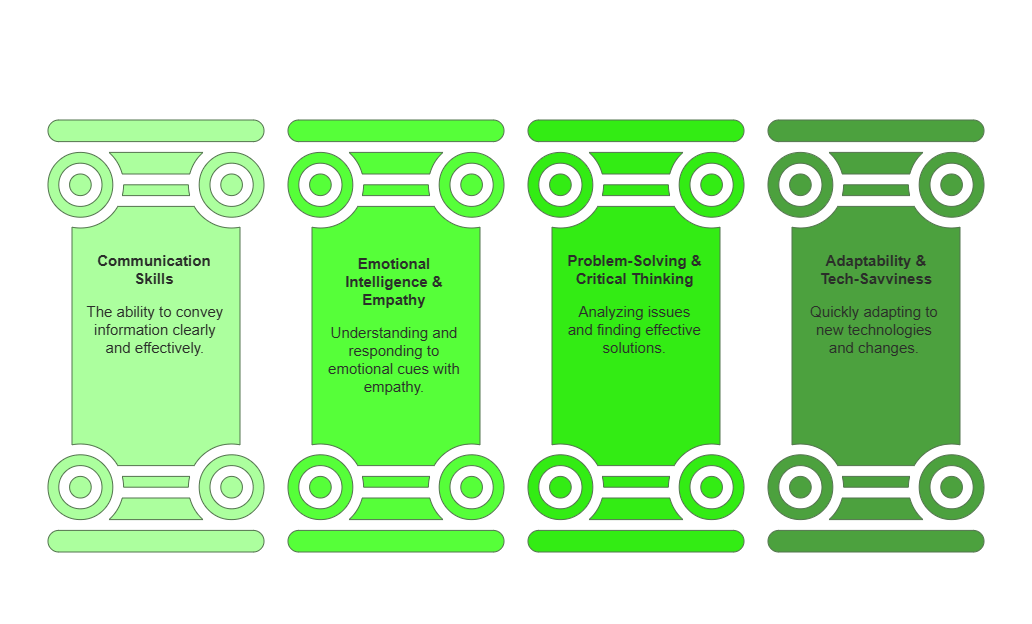Last updated on November 20th, 2025 at 12:35 pm
Want to work in a call center? You are not alone. This career has boomed in popularity over the past few years. Call center roles offer employees flexible working conditions and plenty of advancement opportunities. Plus, it is a great way to learn and grow with all types of brands or industries that interest you. It is important to remember that call center jobs are, at their core, customer service roles a career requiring a specific skill set.
Call centers continue to be a critical component of customer service and sales operations. As we move into 2025, agents need to develop key skills to meet rising customer expectations, leverage new technologies, and improve efficiency. In a modern contact center, agent productivity is more than just speed, it’s about quality, consistency, and performance. Improving contact center agent productivity ensures that your team can handle a higher volume of calls without sacrificing customer satisfaction. Not only does this drive operational efficiency, but it also reduces burnout and improves team morale.
In a modern contact center, agent productivity is more than just speed it’s about quality, consistency, and performance. Improving contact center agent productivity ensures that your team can handle a higher volume of calls without sacrificing customer satisfaction. Not only does this drive operational efficiency, but it also reduces burnout and improves team morale. This blog explores the essential skills for modern call center agents and highlights FreJun as the best solution for optimizing call center operations.
Table of Contents
- What are the Most Critical Skills Call Center Agents Need to Perform Optimally?
- AI-Powered Call Management vs Traditional Manual Call Handling
- Call Center Productivity
- Key Metrics for Call Center Agent Success
- 10 Questions to Determine if a Call Center Role is Right for You
- 1) What Does ‘Customer Service’ Mean to Me?
- 2) How Is My Memory?
- 3) Am I Patient?
- 4) What Is My Communication Style?
- 5) Am I a Good Listener?
- 6) How Do I Solve Problems?
- 7) Do I Have Marketing or Sales Experience?
- 8) What Type of Working Hours Do I Require?
- 9) Can I Work Under Pressure?
- 10) How Are My Tech Skills?
- Integration with Technology for Better Performance
- Frequently Asked Questions
What are the Most Critical Skills Call Center Agents Need to Perform Optimally?
The most essential skills include active listening, clear communication, empathy, problem-solving, adaptability, time management, and CRM proficiency. Tools like FreJun enhance agent productivity by providing call automation, real-time analytics, and seamless CRM integration. To build a high-performing call center team, certain skills are non-negotiable. These include empathy, problem-solving, and communication. Yet, technical aptitude is equally important. When discussing call center skill set, it’s crucial to highlight how agents can leverage CRM tools, dialers, and AI-driven systems to enhance their efficiency. These abilities directly impact agent productivity in call center scenarios.
AI-Powered Call Management vs Traditional Manual Call Handling

Call Center Productivity

Key Metrics for Call Center Agent Success
| Metric | Why It Matters |
| First Call Resolution (FCR) | Measures how efficiently issues are resolved on the first attempt. |
| Average Handling Time (AHT) | Ensures agents are resolving calls quickly without compromising quality. |
| Customer Satisfaction Score (CSAT) | Direct feedback from customers on service quality. |
| Agent Utilization Rate | Helps determine workload balance and efficiency. |
| AI Automation Adoption | Tracks the effectiveness of AI-powered tools like FreJun in improving productivity. |
10 Questions to Determine if a Call Center Role is Right for You
Regular training sessions can boost contact center agent skills like active listening, cross-selling, and escalation management. Consistent skill development fosters faster, more accurate interactions. As agents level up, their proficiency improves, contributing to fast agent proficiency, which helps them manage inquiry spikes more effectively. Ask yourself the following 10 questions if you think you might be a good fit for a call center role:
1) What Does ‘Customer Service’ Mean to Me?
It is crucial to grasp what customer service means to you if you want to be a great call center agent. While solving problems for your company is a big part of the role, the most important aspect is the customers themselves. Do you have what it takes to focus attention on the customer?
2) How Is My Memory?
When working in a call center, you will speak with dozens of customers daily, each with unique queries and issues. It is crucial to remember that these people require great customer service. The client should feel like an actual person with needs, not a number. That’s why a great memory is considered an asset in call centers. Being able to recall and reference things your customer has mentioned will instill more confidence in your support and assure them that you are taking their query seriously.
What if you do not have a great memory? That’s also OK, but try to keep a pen and paper by the phone during your calls and take notes on important details.
3) Am I Patient?
Have you ever heard someone say, “Patience is a virtue”? This phrase is extremely relevant in the world of customer service. After all, your role as a call center agent sometimes involves communicating with customers when they are feeling big emotions. Often, customers are frustrated, scared, confused, stressed, or angry when they contact a call center. That’s why the ability to remain calm and regulated during calls is so important for good customer service and your emotional well-being.
4) What Is My Communication Style?
As a call center agent, your job is all about communicating! In order to provide great service, you must be able to provide clear, accurate, and helpful information to your customers. It is also important that you impart this information in a respectful manner.
5) Am I a Good Listener?
Being a good listener will serve you well throughout every aspect of your life, not just your career. However, knowing how to be an active listener is especially important when working in a call center. When your client explains their question or issue to you, showing you are “with them” and understanding through verbal cues is helpful. This can be as simple as saying “mmhmm” or “right.” They are small enough interjections that will not break your customers’ flow of thinking but will show that you are on the same page.
6) How Do I Solve Problems?
Think about how you approach problem-solving. Do you think outside the box? Do you look at possible solutions from every angle? If so, then you are likely an ideal candidate to become a call center agent. After all, your customer has likely tried a few solutions before contacting your call center for support. What they need now is your unique expertise and problem-solving skills.
7) Do I Have Marketing or Sales Experience?
While call center roles are in the customer service sector, there are times when agents end up wearing other hats especially sales and marketing ones. Your inherent knowledge of your company’s values and branding might help you close a few deals. Having a good grasp of marketing and sales strategies will make that even more likely.
8) What Type of Working Hours Do I Require?
One of the best things about call center work is how flexible it can be. Call center agents often work from home and can choose a schedule that revolves around their lives, not the other way around. However, it is important to remember many call centers were developed to serve customers outside of regular business hours. While it may not be necessary for you to work evenings, weekends, or overnights, certain roles require this availability.
9) Can I Work Under Pressure?
While most call center agents have plenty of training and scripts for their phone calls, it is essential to have the ability to think on your feet. After all, you cannot predict the nature of every call or query that you receive. By being able to keep your cool during a high-pressure scenario, you will be able to remain clearheaded and provide better service and care to your clients.
10) How Are My Tech Skills?
While you do not need to be a complete IT whiz to work in a call center, having a strong technical background is definitely helpful. Your call center will likely utilize some specific software to serve your customers better and streamline your responsibilities. This is great for maintaining an efficient and helpful service. While your company will likely train you to use this software, having a background and understanding of technology is also beneficial.
Once you have considered these 10 questions, you will better understand the ideal call anchor skill set and whether it’s the right position for you. Good luck as you embark on this exciting part of your career.
Key Skills for Call Center Agents in 2025

These are the Key Skills foor Call Center Agents:
1. Excellent Communication Skills
- Clear, concise, and professional speaking skills.
- Active listening to understand customer needs.
- Ability to adjust tone and language based on the situation.
2. Emotional Intelligence & Empathy
- Understanding and responding to customer emotions.
- Staying calm under pressure and handling difficult customers with patience.
- Building rapport to enhance customer satisfaction.
3. Problem-Solving & Critical Thinking
- Quickly analyzing customer issues and providing effective solutions.
- Thinking on their feet to handle unexpected problems.
- Using AI-driven insights (like FreJun’s call analytics) to make data-backed decisions.
4. Adaptability & Tech-Savviness
- Familiarity with cloud-based call center software.
- Ability to learn and use CRM tools efficiently.
- Adapting to AI-powered automation to streamline workflows.
Integration with Technology for Better Performance
Combining soft skills with modern tools is key for optimal performance. For instance, a system that supports Servetel integration enables seamless call routing, better tracking, and valuable analytics. By leveraging such integrations, you equip your agents with the infrastructure to deliver superior customer experiences.
Conclusion
Building a high-performing call center team in 2025 requires strong communication skills, problem-solving abilities, adaptability, and data-driven decision-making. With FreJun’s AI-powered tools, businesses can enhance agent efficiency, ensure compliance, and drive better customer experiences. Ultimately, the right skill for call center agent is a blend of communication capabilities and technical know-how. When your team combines emotional intelligence with proficiency in tools like Servetel, they become more efficient, more engaged, and more productive—exactly what it takes to excel in a fast-paced contact center environment.
Upgrade Your Call Center with FreJun!
Get started today and experience the future of efficient, AI-powered call center operations! 🚀
Further Reading: AI Insights From Sales Call Analysis: Techniques For Maximizing Revenue
Frequently Asked Questions
Clear and professional communication builds trust and solves issues faster. FreJun supports agents with call scripts and automated workflows to stay consistent and effective.
Active listening helps agents understand customer needs better. FreJun’s call recording and transcription features allow managers to coach listening skills with real examples.
Empathy improves customer satisfaction and loyalty. With FreJun, agents can review past interactions for better personalization and more human conversations.
It’s vital. Agents must navigate CRM systems efficiently. FreJun integrates with top CRMs, so agents can handle calls and manage customer data from one place.
Yes. FreJun’s auto-dialer and call scheduler help agents handle more calls efficiently without missing follow-ups or wasting time switching platforms.
Customers expect quick resolutions. With FreJun’s call notes and tagging, agents have full context to resolve issues faster and more effectively.
FreJun enhances training with real call recordings, analytics, and helping teams grow faster and stay aligned with company goals.
